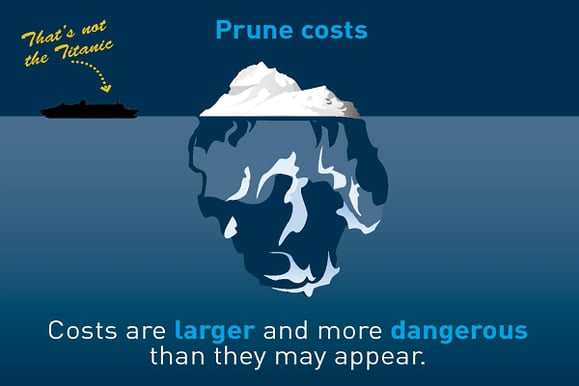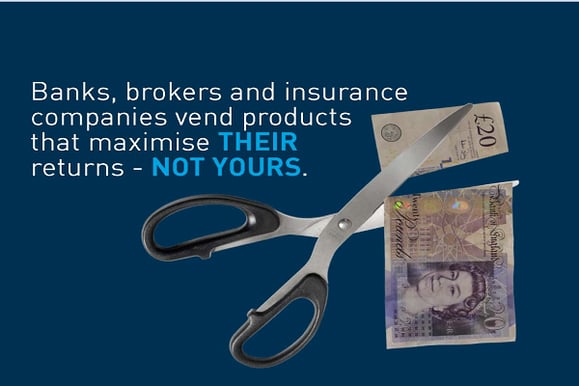

[Estimated reading time: 3 minutes, 44 seconds - read while you decide where to book your next holiday]
- I’m going on an all-expenses-paid cruise;
- I’m taking my wife, we’re staying in a ‘sky’ suite;
- And we’ll have $7,500 spending money.
To qualify, I need to sell you a Cayman Islands based, unit-linked, long-term savings / investment product.
Wait!...
Before you complain…
My wife and I are not really benefitting from any of the above because:
A. I don’t ever recommend Cayman Islands based unit-linked investment products, and…
B. I’m fee-based, therefore I don’t accept commissions or incentives - like free holidays, hot air balloon rides, chocolate tasting events or free drinks evenings!
However…
the above is a genuine offer open to all those in the international financial services industry who operate as brokers.
The offer email was forwarded to me by a friend – and I’m glad it was – because it means I can show you how much expats like you risk losing every time you trust anyone other than a fiduciary with your wealth.
How free financial advice pays for all-expenses paid holidays
The problem with incentive offers like these is that the money to pay for them comes in its entirety from you.
More specifically, it comes off your potential returns in the form of high - and often hidden charges.

This means your money will always underperform the markets - and instead of going up, will spend more time going down.
To squeeze this level of money out of your investments, you also often get locked in to inflexible plans with high surrender or exit penalties.
Worse still, incentives encourage poor behaviour.
It’s not that these salespeople are necessarily bad people - but it comes down to basic human nature…
Like estate agents and car salespeople, the system in which these financial brokers work is geared towards maximising their income and benefits - not yours.
Therefore, your interests are not aligned.

These salespeople are like those who operated in the UK in the 1980s – and they offer the benefit of their financial ‘advice’ for free…
Their ‘free advice’ is neither free, nor is it advice however.
It is paid for via commission taken from a client’s saved or invested wealth.
And it is merely a recommendation, potentially based on what’s in the financial best interests of the broker at the time.
And, when an offer like the above is received by a broker, their ‘advice’ to all and sundry could just be to invest in a Cayman Islands based unit-linked investment product!
There are many similar incentives available from other product providers – like trips to Las Vegas, to play golf in the Algarve, to attend boozy conferences in Switzerland…

And such incentives are a win-win for almost everyone…
1. The salesperson wins because they get to go on a free holiday…
2. The product provider wins because they shift more product
3. The only losers are the expats who take the ‘free advice’ and get tied into expensive, inflexible and opaque contracts, that slowly transfer their money over to the adviser.
Commonly, an expat affected by such a scenario doesn’t find out how badly they’ve been affected until a few years later, when they realise their investments are seriously underperforming.
The high fees pay for - among other things - incentives such as free holidays.
These products have always formed the mainstay of the industry. But since 2012, independent advisers in the UK have not been allowed to accept commissions or incentives such as these.
In consequence, the market has shifted to help clients get lower cost, more flexible, more transparent and better performing options.
The real cost of conflicted financial advice
Obama’s administration estimated the cost of conflicted financial advice for unsuspecting American families was at least $17 billion a year.
That’s $17 billion taken from savers and investors by financial brokers who are not obliged to care.
In expatriate-land where you and I live, 99% of financial advisers are not obliged to care, and are therefore potentially conflicted.
1. They receive a commission for placing your business,
2. They don’t get paid unless they place your business,
3. They are not fiduciaries - therefore they are perfectly entitled to put their financial welfare (and summer holiday requirements) ahead of your best interest.
The result is, it’s entirely likely you do not receive independent advice, but a recommendation that is conflicted.
What’s the solution?
There’s only one solution…
To know the difference between fiduciaries and brokers.
Here’s a checklist to help you differentiate - it’s free to access and free to share.
Please - download it, print it off, share it on social media, pin it to your office wall…because the sooner the secret of conflicted financial advice is properly understood, the better it will be for everyone.
